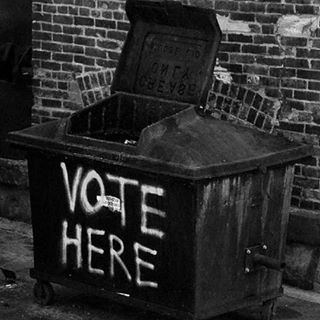U.S. Nationwide Elections: “Swing Status”, be Gone

During the last nationwide election, the one before that, and the preceding one as well, I was led to believe my vote really doesn’t count. Why? Because I don’t live in what our political parties define as a “swing state”, or a swing district, or a swing county. Our media focuses on races and on voters in far away Iowa, Ohio, Florida, or Pennsylvania. OK; voting patterns there may be inconsistent and unpredictable. But what about the ‘predictable’ rest of us?
As far as I understand a swing district is one whose loyalty to a party is not guaranteed. Thus, attention and funds from the two major parties’, trailed by media, is directed there in order to ‘swing’ undecided votes towards their candidate. Duly highlighted by all the networks and even our own local media, we’re informed that a viable and genuine race is underway… over there. We can rest assured our democracy is a fair contest and that our election system works… somewhere.
As for the majority of political races in the nation? One concludes there’s no real contest; results are taken for granted whether by gerrymandered arrangements or by discriminatory policies that thwart registration. Then, there are voters– a lot of them– who simply don’t vote. The status quo is undisturbed.
Maybe this process of designating one neighborhood as politically more vital than another explains why voter turnout across the USA is low, why so many citizens feel there’s no point casting their ballots. We feel excluded.
Viewing a political race as in-the-bag can be perilous, as demonstrated by Clinton’s 2016 campaign after it ignored Michigan and Wisconsin contests. In contrast, Republicans targeting voters in those states; with or without Russian interference or data provided by Cambridge Analytica, Republicans swung voters there away from their traditional alliances.
Attribution of districts as swing or solid is more than a misguided strategy; it’s discriminatory. It may also contribute to the cynicism and disinterest we find among American voters today.
When I lived in New York City, any Democratic candidate on the ballot was viewed as a shoo-in. I and left-leaning associates never felt excited about an election; we rarely discussed one candidate’s merits over another, except perhaps for the mayoral seat. Now I understand how Republicans may have felt.
Moving into a less Democratic constituency in Upstate New York, I’m the one feeling disempowered today. You suggest I might evade this binary system by seeking out a third party candidate. Yet there too my vote feels meaningless. (Small parties often don’t run a candidate and instead endorse a contestant representing a major party.)
In NY’s Congressional District 19, currently represented by John Faso, we’re following a vigorous pre-primary campaign. Seven candidates want to represent Democrats to challenge the incumbent congressman in November’s election. Thus far, local press seems non-committal, but articles elsewhere are highlighting CD 19’s Democratic contestants, generating a rumor that this congressional seat will be hotly contested. True or not, the rumor is beguiling; my very own district could move into the swing column!
“It’s still early in the game,” as politicians and sports commentators say; “Anything can happen”. We still have 6 weeks until the June 26 Democratic primary here.
But the mere suggestion of our significance can have a positive effect. Who doesn’t want to feel significant? Forget about CNN and Fox reporters arriving in our farms and hamlets to interview us. If a contest appears evenhanded, our interest grows, and maybe, maybe, we voters can feel that we really count.
Then comes the question: Why wait for outside rumors about the value of our vote? Why wait for a tarnished Democratic Party which blundered in 2016 pursuing so-called ‘minority’ votes and ‘urban-educated’ citizens to the exclusion of others?
Across the nation, there have been some upsets as vacant seats are announced, and where new faces are emerging to fight in their party primaries. The message I’m getting is that every seat, every election, counts.
Whatever the source of these rumors, I say: grab hold, chase after whomever candidate represents some principle, however personal or vague, which you identify with, whether through their personality, their statements, or their party affiliation. Candidates are usually women and men driven by the ideals of public service, of the possibility of change, and by the energy of fellow citizens. Know them, push them, challenge them.
And advise them. Because these newcomers often really don’t know basic facts about us or how to address our local issues. Then lobby your neighbors thought to be on the other side. Try it.
*
Barbara Nimri Aziz is a frequent contributor to Global Research.

